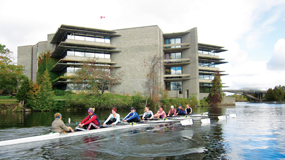
 With Head of the Trent set to begin next weekend, it will be our rowers’ chance for a taste of the limelight. As Trent students, staff, and alumni watch from the bridges and banks of the Otonabee River, you’ll only get a short glimpse as they row on by. Here is a look into what the team does to prepare for regattas.
With Head of the Trent set to begin next weekend, it will be our rowers’ chance for a taste of the limelight. As Trent students, staff, and alumni watch from the bridges and banks of the Otonabee River, you’ll only get a short glimpse as they row on by. Here is a look into what the team does to prepare for regattas.
“It’s a lot of early mornings, sore backs, and a routine of health living that is required year round to stay competitive with other schools. In November, we shut things down until January when we start up again inside and prepare for a regatta in the spring,” said the rowing team’s head coach, Jacqui Cook, who rowed in the Athens Olympics. “That way, they are motivated to keep training throughout the year.”
Practices are Tuesday to Friday, and begin at 5:15 in the morning. On weekends, the rowers allow themselves to “sleep in” because practice starts at 8 a.m., which, for most of us, is still an early morning. “We practice in the morning because there are no classes or other commitments, and no reason not to show up,” explained Cook.
For rowers living on residence, they can get away with waking up just minutes before practice and still make it on time to row, but for upper year students living off-campus, it’s a little earlier. “Most of us off-campus bike here, so I wake up at 4:15 to make it on time,” Danielle Goodwin told Arthur. Goodwin is in her fifth year of study here at Trent, and has been rowing since her second year.
After their early morning row, there is still work to be done. “We’ll go back to shore and the more experienced rowers will get a 45-minute break before going on a second row with a larger team,” Cook said. Despite the extra work that comes along with the second row, “it’s a huge advantage for the people who go out on the second row,” explained Goodwin. “Everyone wants to do it.”
After class, the rowers are expected to do an afternoon workout on their own time. “The rowers cross-train, go to the gym, and lift weights,” said Cook. “After the cross-training routine, the rowers’ day of physical training is over – unless, of course, they have to ride their bike home.”
Behind the scenes, there are a team of four coaches who put long hours in the coach boats: Cook and three assistant coaches; Larry Beattie, Jack Lapin and Scott Bishop.
“They come from different fields, but Jacqui brings them all together,” said Goodwin. “They are here for us all the time. Why would anyone want to be here in the middle of day? Who does that? Only people who want to win.”
Trent rowers get the competitive advantage of having Cook, an Olympian, as a coach. “I don’t know what others teams’ experience is with high level athletes, but who better than the best?” Goodwin praised. “She knows the level you need to be at to compete anywhere.”
The rowers are a competitive bunch. They deal with small technical criticism more than praise from their coaches because, as Cook explained, “We’re fixing little technical problems and constantly making small improvements. It’s a more technical sport than people realize.”
The rowing team trains arduously year-round and are rewarded for this hard work by having Mondays off. Well, sort of.
